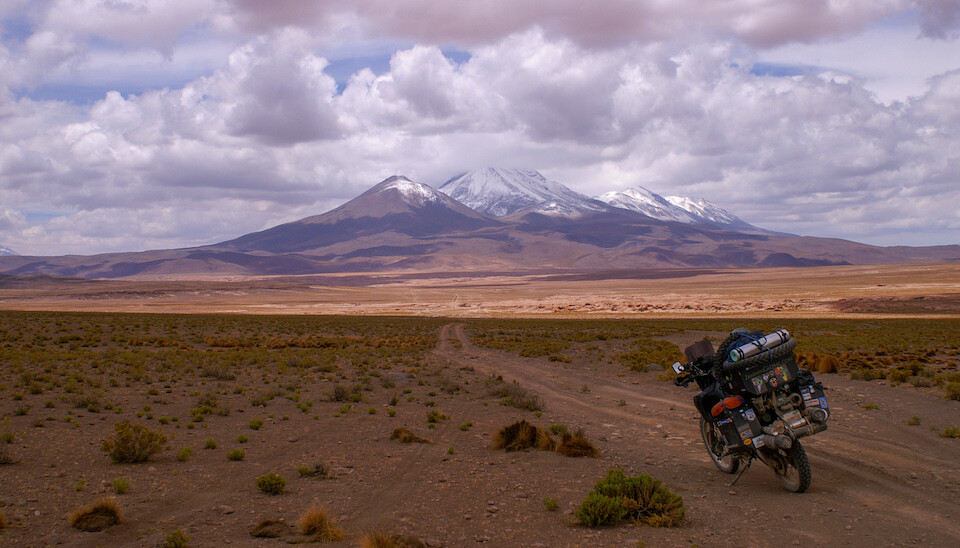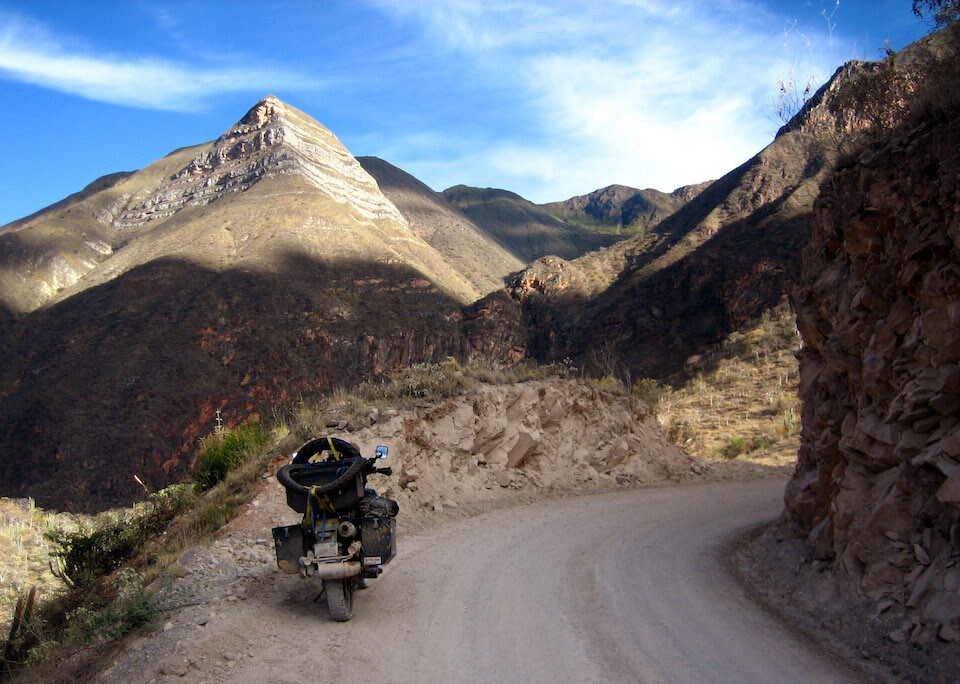10 Things I Learned Riding from the USA to India
— Planning, Published — 5 min read
In March 2010, I traded away my corporate job, house and life in urban America for a solo life on the road. For the next three years and three months, sanDRina, my Suzuki DR650, took me 100,000 km through 33 countries of Latin America, Europe and Africa with the journey ending in India. Here are 10 lessons I learned from this most amazing experience of my life.
 Fish market in Nairobi, Kenya
Fish market in Nairobi, Kenya
#1 Street food is better than restaurant food
During my whole trip, I only got sick from food-poisoning twice and that was from eating at established places. I kept myself on a tight budget as the trip was primarily self-funded, and that meant a lot of street food. I never got sick from it and actually prefer it to restaurant food for the main reason that out on the street, you can see the food being prepared hot compared to the back kitchen of a restaurant, and besides, the germs on the street add to the flavor.
#2 Be spontaneous, forget your plan
I had a rough plan for my journey mainly driven by the local seasons (dry season for the Amazon, summer for Patagonia, etc.) but I stayed open to random changes that came my way. In southern Mexico, the CouchSurfing host I was staying at introduced me to a German girl with dreadlocks who was heading off into the jungle to go see a remote Mayan tribe. She invited me to join her. I changed my plans right there and had a great experience staying with this Mayan tribe and exploring the jungle with her.
#3 Staying with locals is always better than a hotel
On that note, if someone invites you to stay with them, which will most likely happen when they see that you’ve come from a long way away, accept it. In northern Sudan, by chance I pitched my tent on the Nile next to a local fisherman’s camp and they invited me to stay with them. They had no electricity in the Saharan summer, but I survived and started to thrive like them, wearing a jellabiya (the white-flowing dress of desert people), drinking copious amounts of sweet, mint tea and staying cool with frequent dips in the Nile. The nearby hotel would have been a drab affair.
 Jay meditating at the Pyramids of Giza, Egypt
Jay meditating at the Pyramids of Giza, Egypt
#4 Travel slowly
Initially, I gave myself two years to get from the U.S. to India, but in the end that became three-plus. Traveling slowly allowed me to do things such as take a four-week journey aboard a cargo ship across the Atlantic, spend two weeks on the shores of Lake Tana in Ethiopia and really get to know the locals, spend one year in Kenya to get deep into a new culture, and other experiences that the freedom of time makes possible. Not everyone has the luxury of time, but with whatever time you have, spend it in less places so that you can have a deeper experience of that place, rather than a shallower experience of a lot of places.
#5 Never refuse an offer of a meal
In Egypt, I stopped for a drink of water out on the Oasis Route through the Western Desert of the Sahara and this local man with a long beard and a loose turban on a Chinese motorcycle pulled up and signaled with that universal sign for food—fingers bunched together pointing at the mouth. I nodded and followed him a few kilometers off the road to his house. I was told to sit in the front room, and pretty soon a large plate with various dishes of food was brought out by his wife who quickly departed. We ate in silence as I didn’t know much Arabic but I felt we bonded. He allowed me to take a nap during the afternoon heat before I got back on the bike and rode on. Accepting that offer of a meal gave me an insight into the local culture.
#6 Own less stuff
This lesson cannot be told enough. I knew it before leaving that I was taking too much stuff and suffered whenever I had to pick up my fully-loaded adventure motorcycle. But my logic was to plan for as many contingencies as I could, such as a flat tire, which is essential, to the non-essential such as carrying a solar panel on my top box! Always take less stuff than you think you need. You can always buy it on the road somewhere.
 Riding across the Andes in Bolivia
Riding across the Andes in Bolivia
#7 When the bike breaks, you will meet an angel
Instead of panicking when the bike had a breakdown, I learned to just relax and wait for my angel to show up. Whenever I had a serious bike problem, I ended up meeting local people that showered kindness on me and helped me get on my way. There was Helmut in southern Peru who appeared out of nowhere and took me in when sanDRina’s rear wheel bearings gave up, and there was this retired army officer in northern Brazil who took me in as I dealt with a broken throttle cable. I still remember those times vividly and am ever grateful for them.
#8 Get involved with a project besides the travel
Long-term travel is a wonderful experience, but after a few months on the road the travel itself could get boring. To keep your mind active, get involved with something besides the actual travel that stirs your intellectual or creative side. Keeping a blog and getting involved in photography is one way. Another way would be to volunteer along the way, or as I did, study for a distance masters in sustainable development. There are a number of distance programs that can be studied just from a laptop and the occasional internet connection. Use your journey to set yourself up for life after the journey.
#9 Keep a journal
The one thing constant about travel is change. Changing places, faces and experiences. It can almost be too much stimulation for the brain and after the journey it can be hard to remember all the amazing experiences. Keep a journal and note down something in it every day. If you don’t have the patience to write out your thoughts, at least write down what you ate and where you slept. That alone could trigger a flood of memories many years down the line.
 Riding the Cloud Forest Route of Northern Peru
Riding the Cloud Forest Route of Northern Peru
#10 The hardest part is the beginning
Sitting in the U.S., I didn’t know whether I could actually get to India. Would I get all the required visas? Was my budget enough to get me there? What if I got mugged in Mexico? What if I caught some deadly disease in Mozambique? I realized that all these were unfounded fears and the biggest fear was actually starting. It’s easy to get cold feet if you think of every eventuality that could go wrong, but most likely it won’t and you’ll be fine. Just start and let the adventure play out.